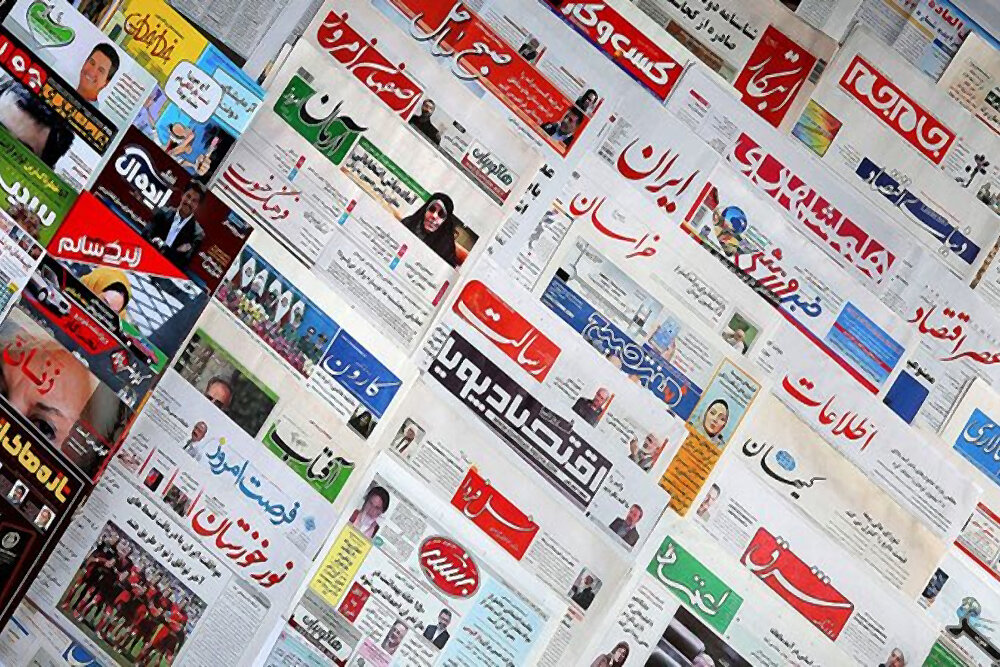Regional agreement without the sheriff

The Sobh-e-Now newspaper refers to the resumption of relations between Iran and Saudi Arabia and writes: The resumption of relations between Tehran and Riyadh is being done while former and current prime ministers of Iraq such as Adil Abdul Mahdi, Mustafa al-Kazemi, and Shia al-Sudani had visited Tehran and Riyadh to finalize it.
In the end, China played a role as a great mediator and showed that Beijing's constructive presence in the West Asian region is a stabilizing alternative to the U.S., which has been managing crises in the West Asian region for decades.
In other words, China is trying to define a role for itself in the region by developing its relations with the countries of the Middle East and stepping into the U.S. shoes in this region.
Even though the friendly relations of the regional countries will be a serious obstacle to the U.S. as a troublemaker in the region and pro-Western elements inside Iran, the renewal of relations between Tehran and Riyadh is a big defeat for the opposition.
During the last 5 months, the opposition did the best of its ability to isolate Iran, but these days they see that not only Tehran is not isolated, but is repairing its relations with the countries and international entities.
Arman-e-Melli: Iran, S. Arabia; the end of the role of extremists
Arman-e-Melli writes: Re-establishment of Tehran-Riyadh relations is very important and can be effective for the security of the entire region.
In 1990, Iran and Saudi Arabia had cooperation, agreement, or at least widespread de-escalation but several factors disrupted the reproachment:
- Transregional challenges, especially between Iran and the U.S.
- Extremists of two countries (especially the attackers on the Saudi embassy in Tehran).
-Hardliners imposed a high cost on Iran's foreign policy.
Israel is the only party that is extremely angry about the re-establishment of relations between Tehran and Riyadh. Because if the relations expand, the Abraham Accords will face a lot of challenges.
The Abraham Accords is an agreement that was supposed to normalize relations between Israel and Arab countries.
The developments of the past 7 years showed that Iran and Saudi Arabia have a wide strategic depth, and unfortunately in many cases, they were against each other, and if the differences are put aside, the strategic depth of the two sides would play a big role in improving political, economic and even cultural relations.
Etemad: Normalization of relations between Iran and Saudi Arabia
In an article in the Etemad newspaper, former Iranian ambassador to Iraq Hassan Danaeifar writes Iran and Saudi Arabia agreed to resume relations.
The Saudi policy change towards the West is a serious thing, but it can be temporary or tactical. This change, along with Iran's will to improve relations with neighbors, was the case that made China take the opportunity.
Some analysts consider the hegemony of the United States in the region as unchangeable. But it seems that the leaders of the UAE, Saudi Arabia, and Qatar feel that the U.S. is not the same as before and they can use the case to create some kind of convergence among the countries of the region.
The United States is not interested in the development of relations between regional countries with Iran. Even if they are interested, they surely want the ties to be in accordance with Washington's views.
What is happening in the region are some unexpected moves from countries that did not seem to take a step against the will of the United States, but now they are doing so.
The normalization of relations can be interpreted as changing Saudi cultural, media, and nuclear policies towards Iran.
Keyhan: Agreement between Tehran and Riyadh is a blow to U.S., Israel
After 7 years, Iran and Saudi Arabia agreed to resume diplomatic relations and reopen embassies within two months.
Keyhan writes the agreement angered three parties;
The U.S., and Israel, the pro-Western currents in Iran are the three parties that were angered by the agreement.
The U.S. and the Zionist regime, who were happy with the unrest in Iran for months, were angered by the deal.
The agreement between Iran and Saudi Arabia made the Zionists mourn.
Barak Ravid writes: "I don't know what will be the outcome of the agreement between Saudi Arabia and Iran and whether it will be implemented or not, … but if the agreement is implemented, it will be a severe blow to Israel and the peace agreements, and it shows that the prime minister of Israel has been dealing with nonsense for the past 10 weeks."
Kayhan also believes that the agreement, in addition to angering America and Israel, also pleased the pro-Western groups in Iran.
Hamshahri: Towards a new order
Hamshahri writes in recent months, Iran had tried to improve its relations with Saudi Arabia, Jordan, and Egypt, but had not succeeded because they were aware of Iran's obstacles and used the talks just to control the tension, not to reach an agreement. But China's need for security in the Persian Gulf changed it.
China's relations with Tehran and Riyadh and the Saudis’ need to distance themselves from the U.S. created a new condition.
An important lesson that can be learned from the agreement is that such an accord should be made with Kuwait, Bahrain, and also with Iraq, Pakistan, and Afghanistan.
Iran could not create a new positive order after the change in the nature of U.S. presence in the Middle East, but it can control the new order or at least participate in it.
Leave a Comment